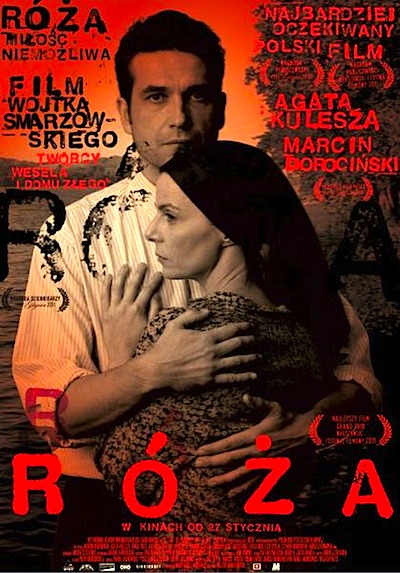By Joe Bendel. The war is over, but for many Polish women it’s hard to call the aftermath “peace.” This is especially true for ethnic German Masurians, formerly of eastern Prussia, like Rose Kwiatkowska. Though Poland has been “liberated,” they are constantly reminded that “their side” lost, and are treated as treasonous pariahs, accordingly. Yet, Kwiatkowska’s situation is especially dire, as a mysterious Polish veteran slowly discovers in Wojtek Smarzowski’s uncompromising Rose, which opened the 2012 Brooklyn Film Festival Friday at the Brooklyn Heights Cinema.
Tadeusz Mazur is a world-weary Home Army veteran, who witnessed things during the Warsaw Uprising no man could forget. He watched as his wife was raped and murdered by the rampaging National Socialists, and was also present during the death of Kwiatkowska’s husband. She is not exactly welcoming when he turns up to deliver some of her husband’s effects, yet a bond slowly forms between them. Kwiatkowska needs protection from the Soviet-aligned bandits, who literally rape and pillage their way through the Masurian countryside. She could also use his help clearing the landmines from her fields, so they can harvest the potatoes. As for Mazur, he has his reasons to lay low, hoping not to attract the attention of the NKVD. However, Masuria is not the best place to be to avoid trouble.
 Michał Szczerbic’s screenplay is brutally direct and honest about the treatment of women during wartime by the Germans, the Soviets, and their minions (indeed, they all seem to blend together throughout the film). The sheer volume of sexual assaults in Smarzowski’s historical drama is overwhelming, but they are never treated in a lurid or sensationalized fashion. Rather, it is a harrowing depiction of an ugly period of institutionalized score-settling.
Michał Szczerbic’s screenplay is brutally direct and honest about the treatment of women during wartime by the Germans, the Soviets, and their minions (indeed, they all seem to blend together throughout the film). The sheer volume of sexual assaults in Smarzowski’s historical drama is overwhelming, but they are never treated in a lurid or sensationalized fashion. Rather, it is a harrowing depiction of an ugly period of institutionalized score-settling.
Yet incredibly, Rose is a fundamentally a love story, sensitively bringing to life the brief but intense relationship that develops between Kwiatkowska and Mazur. There are no cute courtship rituals or romantic contrivances. They simply fall in love (or something near enough to it), while banding together to survive. It is definitely not pretty, but in a way, it is kind of beautiful.
Marcin Dorociński is riveting as Mazur, portraying him as both a flinty man of action and a tragic romantic hero. It is a bit surprising how thoroughly he dominates the film (since it is called Rose), but he does. Agata Kulesza is also quite haunting as Kiatkowska, creating a profile of herculean endurance. Their scenes together are quite special.
Despite somewhat rushing the third act (which features a few “wait, he did what?” moments), Smarzowski (previously represented at BFF with the gritty Martial Law-era noir The Dark House) deftly helms Rose, capturing the sweep of terrible historical forces, but maintaining an intimate focus. He forces viewers to confront the nature of the crimes committed against Kiatkowska and other Masurian women, up close and personal. Polish free jazz bass clarinetist Mikołaj Trzaska’s eerie minimalist score also heightens the unsettling mood.
Rose can be tough to watch, but it is an excellent film. Highly recommended, it screens again this coming Thursday (6/7) at IndieScreen, as part of this year’s Brooklyn Film Festival.
LFM GRADE: A
Posted on June 4th, 2012 at 9:30pm.